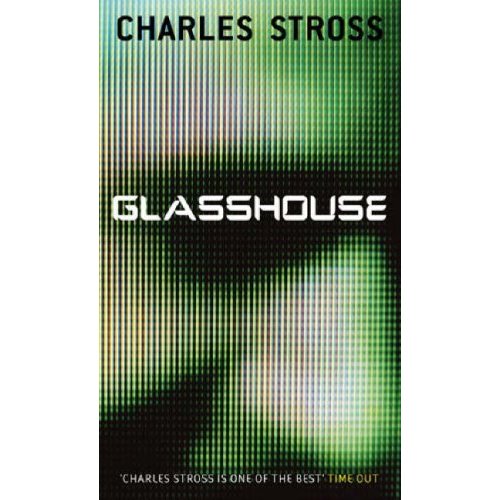Charles Stross, Glasshouse
reviewed by Danielle L. Parker

|
|
Glasshouse
Author: Charles StrossPublisher: Ace, 2006 Hardcover: $23.95 U.S. Length: 335 pages ISBN: 0-441-01403-8 |
Charles Stross makes clever use of the unreliable narrator technique in Glasshouse. We meet Robin post-reconstruction, when he’s not quite sure who he is, or more importantly, who he was. Humans live on indefinitely in this future, but with age comes not just decay of the body, but boredom, depression, a world as gray as winter. It’s not enough to replace one’s body for something new, as the humans of this future do as casually as cosmetics; one must also purge the mind. Kill the memory, kill the self just a little bit, and regain the lost vivacity of a fresh viewpoint: it’s electroshock for the brain, future-style.
But Robin’s past self (or selves, since he remembers several, in chaotic, broken-crockery pieces) has also left him a problem. Someone wants to kill him. There’s a war behind him in that lost past, a high-tech war with a killer virus called Curious Yellow (is this a riff on those yellow-jacketed Curious George books?) that monkeys with both human memories and psyches and the intelligent emotional machines that power this future age. Because of that virus, the former integrated civilization, linked by T-gates (worm-hole transport gates) and A-gates (assembly gates, something like Star Trek transporters, which disassemble and re-assemble matter, living or otherwise, from the raw material of atoms) has cracked into a million little fiercely guarded pieces (or polities, as Stross calls them).
But not all enemies of that hard-fought war, with atrocities committed on both sides, have been caught. Half of them have escaped, and they seem to have a grudge for our newly erased and clueless Robin. To hide, Robin checks himself into the Glasshouse — a deliberately isolated social experiment that wants to mimic the critical period when man moved from the dumb machines of the 20th and 21st century to the emotional machines of the future age. In the Glasshouse, Robin himself will wear a new face and a new name — hopefully, one that will hide him from his enemies.
Of course, we know his enemies find him. In fact, we soon see that the entire Glasshouse has been perverted to a new purpose. Robin, helplessly immersed in the body of a weak young woman, can only struggle to understand its purpose and search — with limited success — for the lover that followed him into the Glasshouse (she, too, has a new form and a new name).
But the hijacked social experiment Robin is immersed in (under his/her new name and persona of Reeve — are you keeping track of these gender changes?) becomes more and more dangerous. Someone’s really monkeying with the human brain now... and Robin/Reeve, who just might be a secret agent, has to find out what the fugitive criminals of the Curious Yellow war have planned for their come-back, if he/she doesn’t get killed first...
Stross has written an interesting, somewhat difficult book. Background information is imparted in situ (as it should be) and may take some head scratching on the part of a reader, at times. I was unsure, for example, more or less to the end, what kind of starship a MASucker was, though it’s a key to the finale.
On the character side, the romance between the protagonist (as the woman Reeve) and her newly assigned ‘husband’ Sam is delicately handled and touching. But I had serious trouble reconciling the gentle, sad, ethical, sexually restrained Sam with the hop-in-bed, outgoing, hip-swingin’ character that Sam eventually proves to really be (for as Robin turns into the woman Reeve, so too does another key character turn into the man Sam, in the Glasshouse. I won’t say ,who, for fear of spoiling the plot for a new reader, but it’s not hard to figure out). I wanted Sam back!
Still, character inconsistencies aside, Stross is one of the few new speculative fiction writers that I remember to always look for. Enjoy!
Copyright © 2007 by Danielle L. Parker

